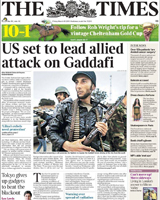“At long last. The international community, which for once deserves its name, has taken a clear stance on Libya,” Libération writes in relief. For the French daily, “the diplomatic pressure from the French has paid off. Apparently isolated with Britain just two days ago, France has finally succeeded in getting a UN Security Council resolution authorising ‘Member States [...] to take all necessary measures [...] to protect civilians and populated civilian areas under threat of attack’ from the Libyan regime. And it achieved its desire to keep Gaddafi’s air force on the ground to prevent the insurgency from being crushed.”
For the French press, praise for this vote goes first and foremost to Nicolas Sarkozy. “Caught on the wrong foot by the Tunisian revolution, struggling to pluck up its courage during the revolts that brought down Mubarak, Paris finds itself back in fighting form for Libya,” remarks Libération. Nicolas Sarkozy quickly grasped the magnitude of the tragedy as an opportunity to play a role similar to the one he played in the Georgia crisis in August 2008, when he chaired the European Union. “Our country has played fully its role in mobilising the international community and waking the United States from their slumber,” says Le Figaro. As a Mediterranean power, France has a duty to help save the Arab Spring.”

“It is a bitter irony that the anniversary of the start of the Iraq war should fall precisely this weekend,” writes The Independent. “Eight years after the battles for Baghdad and Basra, the UN Security Council has given approval for an exclusion zone over another Arab land. The legacy of Iraq haunts every move.” But faced with Gaddafi, the international community – and Europeans in particular – could not afford to sit on their hands. “It takes just a gun or even a rope to kill the people whose joyful faces we see in the headlines and on television,” writes a moved Rzeczpospolita. “Hopefully the world is not acting too late. Hopefully we can prevent another Rwanda.”

In fact, writes Le Figaro, “in Benghazi, the moral imperative falls on everyone. Adopted by the UN in 2005 to take on board the lessons from Rwanda and Bosnia, the ‘duty to protect’ civilians who are threatened needs no clearer prompt. It’s not just altruism. ‘Realism’, which is sometimes opposed to morality, is on the same side here.” More prosaically, says The Times, “This isn’t Rwanda, or Darfur, where we could allow hundreds of thousands of people to be killed, and the only impact on us would be on our consciences. This is closer, in many ways, to Bosnia where our interests turned out very much to be at stake.”
But what a waste of time in getting there, regrets Switzerland’s Le Temps. “Valuable time dribbled away in diplomatic posturing,” laments the daily. “This is what our world of ‘soft governance’ looks like after the Cold War, after the big American lie in Iraq. No government has the guts any more to intervene ‘in the old style’, to parachute secret agents into the jungle or the deserts or to secretly back guerrillas or a liberation movement. Political correctness has won the geopolitical battle. Legality has taken precedence over justice.”
And now? “If Gaddafi holds onto power it will be a humiliation for all the Western leaders who wanted his downfall,” warns Le Figaro. “Let’s not kid ourselves. To save Benghazi means going to war.” Having announced a suspension of military operations on 18, the Libyan regime may well have created a whole situation. But if it neverthless seeks to crush the insurrection emanating from Benghazi, the international community will be compelled to take military action, already "hazardous", according to De Standaard.
What do we do if air operations fail? asks the Belgian daily. “Put boots on Libyan soil? And if Gaddafi sends his anti-aircraft batteries and tanks into populated areas, and civilians die in a bombing run? Will we be surprised if we later stand accused of neo-colonialism at a time when Arab countries were taking pride in liberating themselves?”
“From a moral standpoint, we can only support the UN resolution,” concedes De Standaard. But is the exclusion zone the right solution? “After Iraq, we know that war is unpredictable from day one and does not lead to democracy. This is not an invasion, however, as shown by what happened in Kosovo in 1999. And it may take some time before a dictator changes his tack.”
European Union
Cameron and Sarkozy, the EU's generals
In David Cameron, “who made a 180-degree turn towards interventionism” and Nicolas Sarkozy, who has gone “from zero to hero” in just a few days, the EU now has a “Franco-UK axis [that] aims to spearhead European security,” writes Jose Ignacio Torreblanca in El País. The other Europeans, especially Germany, Spain and Italy, who opposed intervention in Libya, will now be in “a quandary”, the Madrid daily writes: “Respect the compromise [intervention, but only after a vote at the UN] or allow military actions to be left in the hands of this French and British mini-directorate”. A victory for the Libyan dictator would be difficult for the EU to swallow, El País goes on to warn. “The humiliation would be threefold” because of “its initial passivity, the internal divisions it has exposed”, and “because it would then have to live with Gaddafi’s blackmail over energy and migration.
Was this article useful? If so we are delighted!
It is freely available because we believe that the right to free and independent information is essential for democracy. But this right is not guaranteed forever, and independence comes at a cost. We need your support in order to continue publishing independent, multilingual news for all Europeans.
Discover our subscription offers and their exclusive benefits and become a member of our community now!












